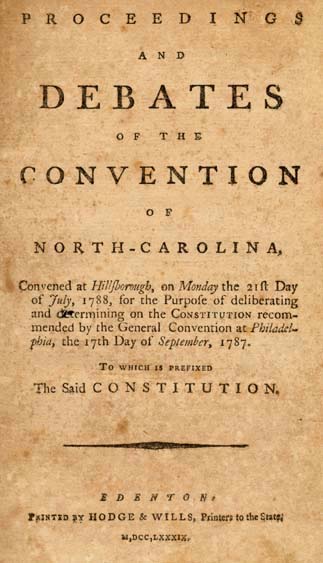 Anti-Federalists
Anti-Federalists
During the debates over the ratification of the U.S. Constitution in the late 1780s, supporters and opponents of the Constitution evolved into two opposing political parties. Those who endorsed the Constitution were soon called Federalists; those who opposed it or favored waiting until the document was revised to address their concerns about preserving individual rights were termed Anti-Federalists. The Anti-Federalists only became a party when the Constitution was being voted on by the states and it ended soon after opposition to ratification ceased, but the roots of the party went back for many years.
Many Anti-Federalists preferred a weak central government because they equated a strong government with British tyranny. Others wanted to encourage democracy and feared a strong government that would be dominated by the wealthy. They felt that the states were giving up too much power to the new federal government. Another major objection was the lack of guarantees of individual rights in the Constitution as it then stood. Until the adoption of the Bill of Rights in December 1791, there was no right of trial by jury or freedom of assembly, speech, religion, or the press.
North Carolina was strongly Anti-Federalist. Most citizens were small farmers who, while self-reliant and independent, were also by and large provincial and uneducated. They were concerned with their families, crops, and local matters; they gave little thought to the other states or foreign countries; and they were content with the weak government of the Confederation. The state's Anti-Federalist leaders included Willie Jones, David Caldwell, Lemuel Burkitt, Thomas Person, Samuel Spencer, and Timothy Bloodworth.
While most of the state was Anti-Federalist, Federalist sympathies dominated the Albemarle and Pamlico Sound regions and the port towns of Edenton, New Bern, Halifax, and Wilmington, where navigable rivers encouraged trade and access to the outside world and helped connect these areas with the rest of the states. Somewhat unexpectedly, the Cape Fear River region, home of many wealthy planters and an area also dependent on trade, was strongly Anti-Federalist. Only in Wilmington was there much Federalist support.
The split between Federalists and Anti-Federalists continued even after North Carolina joined the Union. Many citizens distrusted the Federalists, who strengthened the central government and began to persecute political dissenters. At the suggestion of Thomas Jefferson, the Anti-Federalists began calling themselves Republicans. Under this name, they grew in strength until they won the presidential election of 1800. In North Carolina, Republicans dominated state politics, and Federalists declined and practically disappeared after the War of 1812.
Educator Resources:
Grade 8: Federalists v. Anti-Federalists. North Carolina Civic Education Consortium. http://civics.sites.unc.edu/files/2012/04/FederalistsAntifederalists.pdf
References:
John C. Cavanagh, Decision at Fayetteville: The North Carolina Ratification Convention and the General Assembly of 1789 (1989).
Cecilia M. Kenyon, ed., The Antifederalists (1966).
Jackson Turner Main, The Antifederalists: Critics of the Constitution, 1781-1788 (1961).
Louise Irby Trenholme, The Ratification of the Federal Constitution in North Carolina (1932).
Additional Resources:
Cherry, Kevin. "Summary of Proceedings and Debates of the Convention of North-Carolina, Convened at Hillsborough, on Monday the 21st Day of July, 1788, for the Purpose of Deliberating and Determining on the Constitution Recommended by the General Convention at Philadelphia, the 17th Day of September, 1787: To Which is Prefixed the Said Constitution." Documenting the American South, University of North Carolina at Chapel Hill. https://docsouth.unc.edu/nc/conv1788/summary.html.
"Minutes of the North Carolina Constitutional Convention at Hillsborough North Carolina. Constitutional Convention (1788) July 21, 1788 - August 04, 1788." Colonial and State Records of North Carolina 22, pages 1-35. Documenting the American South, University of North Carolina at Chapel Hill. https://docsouth.unc.edu/csr/index.html/document/csr22-0001.
"Appendix A. Political parties in the United States, 1788–1840" A North Carolina History Online Resource. https://ncpedia.org/anchor/political-parties-1788-1840.
Image Credit:
Proceedings and Debates of the Convention of North-Carolina, Convened at Hillsborough, on Monday the 21st Day of July, 1788, for the Purpose of Deliberating and Determining on the Constitution Recommended by the General Convention at Philadelphia, the 17th Day of September, 1787: To Which is Prefixed the Said Constitution. Edenton, N.C.: Hodge & Wills, 1789.
1 January 2006 | Norris, David A.